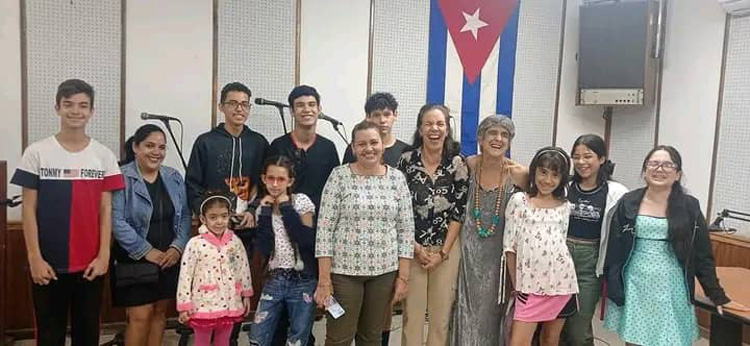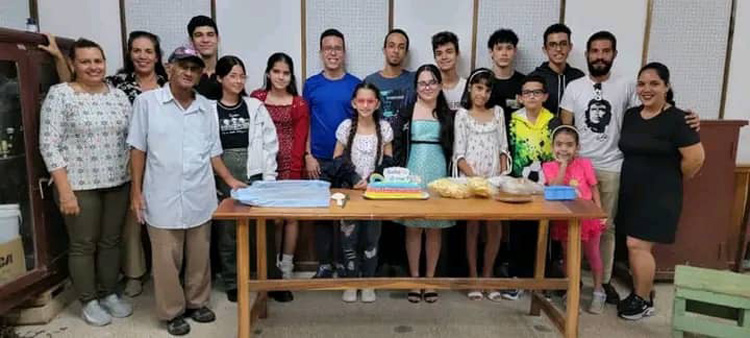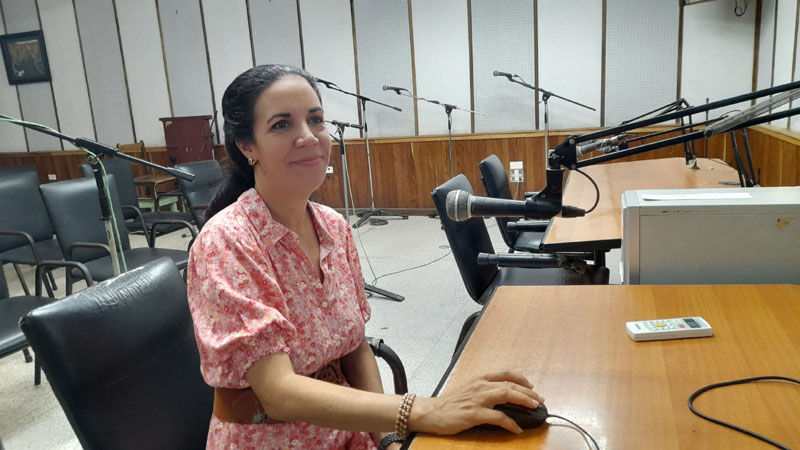Since I was a child, her voice was present in my mornings when my grandmother at 7 o’clock would turn on the radio tuning CMKO Radio Angulo and the program Fiesta de colores, a world of fantasy where she plays the character of Malévola (Malevolent), the fairy friend of children. Later I discovered that she is also a broadcaster of regular programs such as Memorias, Esto sí sabe a Cuba, Huellas and many others that have marked her 28-year career dedicated to the magic of radio.
Dayana Agüero Parra is an actress, announcer, scriptwriter and program director of the main plant of the Holguin radio system. She has qualities that make her a trainer of new generations, teaching day by day what she learned from great masters of acting and voice-over in the “Cuban City of the Parks”.
How did you start in the world of radio?
“I started in Fiesta de colores, the program I am currently directing, at that time it was done by Miguel Gutiérrez, who was in charge of the children’s drama group and taught me the first acting techniques. The first character I played was called Fantasiosa, she was the computer of the fantasy kingdom and then with time Ana Irma Sanz writes Malevolent, a mischievous fairy who likes to use diminutives sharing with children, today I keep that character”.

interview dayana aguero 04
Who is the person who introduced you to this media?
“I came to the radio by chance at the age of 16 accompanying a neighbor named Jorge Soto, who was interested in the art world, he was family of Hernán Zaldívar, radio producer and the person who coordinated at that time for me to start, but when I discovered this world I liked it so much that I decided to stay in it. That boy later developed his career in the world of music and today you can listen to him on Cuban tracks, he is known in the artistic world as Papushi”.
How was the CMKO Radio Angulo Drama Group formed?
“The actors are quite united, before there were more projects than nowadays, there was even a series of fiction adventures, made during the time when it was recorded on tape, which distinguished us and we won awards many times in national radio festivals. It was called Los audaces contra los demonios, I remember that for the part of the effects of Captain Almano, protagonist of the story, Armando Bielsa, the stuntman, created a metal plate for the shoes to simulate the steps in a spaceship.
“Anselmo Oramas played Captain Almano, they wrote the story between Alfonso Bandera and Gabino Gil Molina. They took turns, one season was written by one and directed by the other or vice versa, it was done with the dramatic block, at that time there was Tatiana, Abdalis Lopez and a fairly large group.
“At the moment we are not doing adventures of that kind, now we are doing other projects such as a youth series called El documental, where young people who are part of the cast and others who are joining for the first time in the production of a dramatization on the radio are acting. We have children’s programs such as El farolero, Que cuenten los niños, Puerta a la imaginación, all of them are made with children linked to the radio and other dramatized programs for adults such as El cuento and Estampas holguineras”.
What programs have you participated in?
“I started within the children’s drama group when, at the same time, I had a program that was broadcast at 6:50 in the afternoon, the pioneer news program called Informativo OP. That was my first time in voice-over, with ten minutes of live broadcasting where they selected the boys who were best trained in reading so as not to have to correct so many mistakes, since there was no opportunity to repeat. I also presented the news program of the Hermanos Saíz Association, which was first called El ruido and then Pulso diez, as well as ¿Qué tal, joven? marking my beginnings in this kind of spaces.
“When I started studying at the Holguín branch of the Higher Institute of the Arts (ISA for its Spanish acronym) I was called by Tele Cristal local channel to present Espiral, my first television program, which was dedicated to the universe of science, technology and the environment. Currently, it is not on the air but I was doing it for many years and I liked it very much”.
What does the program Vitrola alternativa mean to you?
“Tatiana (Galvan) started this program and due to work issues she could not continue doing it, so she talked to Danilo Guerrero to continue it, he had already heard me here at the station and one day he told me: I like your voice, I would like you to do the program because it has the style that fits you and many topics to announce in English, because I had studied that language with a private teacher. I told him let’s try it, copy me in a memory some programs for me to listen to it and that’s how it was. Then Danilo took it to compete in events such as the festival of young filmmakers of Villa Clara, La vuelta abajo and Lloga where he won several awards. We are happy with the result of Vitrola alternativa”.
How did the series El documental, which airs Monday through Friday at 6:50 p.m., come about?
“I was inspired by the book Dilo en voz alta y nos reímos todos, by Nando López for the first season, it is a play that is narrated from the point of view of a teacher. I adapted it by making it from the perspective of a journalist with the mission of producing a documentary, the first part takes place in a high school and the second in a pre-university”.
interview dayana aguero 03

On working with children…
“It’s quite complicated because working with children requires patience. I have to be on top of them telling them to turn off their cell phones, these are challenges of these times, but it is nice to share and learn at the same time, for example what series they are watching now, what animated series they like, what kind of content they download, that helps you to shape the programs that are aimed at this age group, you have to speak in their language, move in the things that interest them to create products of this type”.
What is the most difficult role you have had to play?
“It was in a program that Jorge Ribail brought me in 2000, it was called Un ejercicio de estilo with the theme nacimiento de palabras, Virgilio Piñera’s script that he adapted for radio, something difficult to interpret, a woman who masturbates and then stops words. She was a master’s and creative award winner at the Lloga.
“Ribail gave me the script and I had to prepare myself more or less for a week to be able to take on the character. I was accompanied by Migdalia Albear and Karen Cano; their narration part had a metronome in the background and it was a duet, it was a complex job. Julio César Almaguer also participated as an actor, between us we made up the production of this space that competed in the category of experimental or avant-garde programs”.
How difficult is it to mount a dramatized program with sound effects?
“The work of the actor with the sound effects artist is in unison because when there is a fight scene or any other kind of scene you have to work together with him to make it look natural. The other part of the sound effect with the musicalizer must be updated to give a level of credibility to the dramatization at the moment that the editing touches”.
Any message you could transmit to the new generation that wants to get into acting?
“Anyone who is interested in acting can approach the radio, we have a children and youth group with a wide range of proposals, where the new generations can participate. To train actors is not an easy task, this happens gradually, but always the first time a teenager or young person comes to the radio he/she should watch the recording of the programs so that he/she has an idea of how it is done and then, when he/she feels more confident, give him/her a script to see if he/she has the aptitude or not to work in the media”.Dayana’s versatility in acting and her unmistakable voice, make her the creditor of countless listeners who follow her programs, recognizing that Radio Cubana, 102 years after its foundation, continues to be the sound to see of Holguin’s families.
By John Alex Fernández Leyva, Journalism student
- Numa Develops Solar Energy Use in Holguin - 16 de December de 2025
- Polar bear struggles to survive in a changing environment - 16 de December de 2025
- Etecsa Announces New Offer for Residential Nauta Home Internet - 15 de December de 2025

